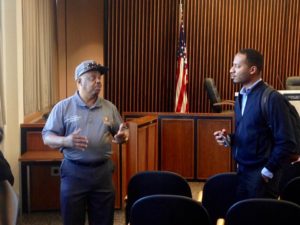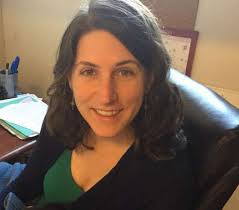Harvard Students Visit Port Arthur to Learn about Petrochemical Dangers
Tour helped students understand how industry pollution harms communities
By Stephanie Thomas

The industrial Texas town of Port Arthur is on the frontlines of environmental pollution. Given the current and historic disparities among communities in southeast Texas, how can policy makers devise protections that help all of them thrive?
On January 24th, I joined students from the Harvard Kennedy School of Government who came to Texas to learn about key policy issues here. The students were part of two fellowship programs: the Fellowship for Serving African American Communities and the Gleitsman Program in Leadership for Social Change. The fellows selected the Houston region to learn about the unique needs of African American communities here and to examine issues of gentrification and housing, education, environmental health and pollution, and the devastating impact of climate change.
While the fellows were planning the trip to Texas, they reached out to local leaders to set up meetings and site visits. The fellows were especially interested in visiting Port Arthur, a heavily industrial city about 90 miles east of Houston.
The students met with John Beard, a Port Arthur resident and director of the Port Arthur Community Action Network (PA-CAN), Suzanne Williamson, a Groves resident who endured hardship from a recent chemical explosion, and Port Arthur City Council Member Cal Jones. The trio of locals vividly described their experience of living in the shadow of the petrochemical industry in southeast Texas. Then Beard led the students on a tour of Port Arthur’s vast petrochemical footprint, sharing stories of his community and how it has been adversely affected by the industry.
Port Arthur is famous for Hall of Fame football coach Jimmy Johnson and rock music legend Janis Joplin, as well as jazz musicians such as Zachary Breaux. But nowadays, Port Arthur isn’t the vibrant community it once was. The working-class city has suffered big losses. Port Arthur is home to a large petrochemical complex, including the largest oil refinery in the entire United States, but it suffers from high poverty rates. The wealth generated at these massive facilities has not translated into prosperity for many of the town’s residents. When Hurricane Harvey inundated southeast Texas with its torrential rainfalls in 2017, it affected almost every resident of Port Arthur. And they have not received the same kind of assistance as other communities in the region.
The conversation and tour left a big impact on the students, and I’m sure it will stick with them as they take on leadership roles in the policy world. You can read more about the visit in this write up in the Beaumont Enterprise
Akiesha Ortiz, program manager for the Harvard fellowships, told the newspaper that the visit was eye-opening and informative.
“We’ve received more than we ever thought we’d get,” Ortiz said. “Everyone has been so in-depth, so knowledgeable. The work everyone is doing is so touching and meaningful.”
 Stephanie Thomas is Public Citizen’s Houston-based environmental researcher and organizer.
Stephanie Thomas is Public Citizen’s Houston-based environmental researcher and organizer.